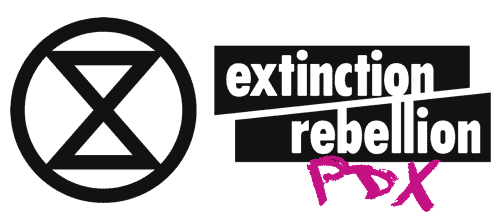XRPDX didn’t exist when the Portland Clean Energy Fund passed in 2018, but it was and is a big victory for climate justice and a move towards a just transition. It does exactly what we need to be doing: levies a surcharge on corporate sales and uses that money for justice and climate projects in low income communities. Led by a coalition of BIPOC groups, Portlanders voted by a large majority for PCEF.
Recent developments
PCEF has been in the news lately. A recent audit highlighted issues around performance metrics, budgeting and transparency within the fund. Other news accounts reported on a grant that was awarded by PCEF to a nonprofit whose founder had a history of defrauding energy companies and had failed to pay taxes in three states. The grant was subsequently rescinded and awarded to another nonprofit.
The Portland Business Alliance (PBA) demanded that PCEF funds be frozen and instead directed to programs for the homeless, property tax relief and other projects. The PBA opposed PCEF during the campaign. They said that they had warned early on that PCEF would raise more than claimed and would lack strong accountability measures and oversight. With respect to “would raise more than claimed,” PCEF made estimates of how much revenue would be generated and the amount of funds was much more than expected, which should be applauded rather than denigrated. PBA’s proposal for using PCEF funds is based in self-interest, not a compassionate engagement with houselessness issues.
In response to criticism, City Commissioner Carmen Rubio said no groundbreaking program is perfect out of the gate. She said structural changes are being made and asks that we not undermine the program before it’s been given a chance to deliver its goals. Rubio said that PBA should be a partner on climate issues, but given their history of animosity toward PCEF that seems unlikely. Marcus Mundy, Executive Director of the Coalition of Communities of Color, also criticized the attack by PBA, claiming they were shirking their responsibility to take action on climate change.
The City Council said they will address, in the next 9-12 months, the following discrepancies that came out of the audit:
- Define performance metrics and create a timeline to finalize program metrics and equity plan.
- Develop recommendations to Council for clearer strategic direction on climate goals relevant to PCEF. PCEF is supposed to bolster the Portland Climate Action Plan which expired in 2020. The grant committee has relied on the 2020 Portland Climate Emergency Declaration which left the program to determine for itself how to contribute to the city’s updated climate strategy.
- Begin a conversation with the PCEF Committee and Commissioner Rubio to outline options for City Council consideration to improve transparency and provide greater budgeting consistency.
- Continue to assess the Committee’s governance structure.
For more info, please see this.
The program is in alignment with XR US’s Fourth Demand for a just transition. Therefore, XRPDX supports PCEF and will pressure the City not to concede to the demands of the business community.
PCEF history
PCEF, unlike most climate policy solutions conceived of and led by mainstream white-led environmental organizations, was from the beginning led by local leaders representing communities of color. The PCEF coalition included Verde, the Asian Pacific American Network of Oregon (APANO), Coalition of Communities of Color (CCC), NAACP Portland Branch, OPAL Environmental Justice Oregon, and the Native American Youth and Family Center (NAYA). These groups represent communities most impacted by climate change and the initiative focus was on climate solutions that provide direct community economic benefits. Many predominantly white groups, including Portland Audubon, 350PDX, the Oregon Chapter of the Sierra Club, Columbia Riverkeeper, and Oregon Physicians for Social Responsibility lent critical capacity and support to the initiative, but leadership stayed in the hands of leaders representing communities of color. PCEF had broad support throughout Portland from a variety of organizations.
The PCEF was passed in 2018 with 65% of the vote and is funded by a 1% surcharge on the business license fee of national mega-retailers based on their sales in Portland. Retailers do not pay the surcharge on food, medicine or healthcare, and small- and medium-sized Portland businesses are not affected.
There are four funding areas:
- Clean energy programs that include renewable energy and energy efficiency (40-60%);
- Workforce development and contractor training support with a priority on union apprenticeships and for contractors that provide health insurance (20-25%);
- Regenerative agriculture and green infrastructure (10-15%); and
- Innovation for clean energy projects that do not fit into the other areas (5%).
The program creates living wage jobs that pay 180% of the minimum wage for residential projects (currently $20.60 per hour) and prevailing wage for commercial projects. The Portland Clean Energy Community Benefits Fund (PCEF) will also establish a High Road Advisory Council that will provide guidance about workforce and contracting issues
A grant committee was created to establish guidelines for projects, review applications and submit their recommendations to the Portland City Council for approval. In April 2021 the city council voted to approve 45 grants: 29 planning, 8 clean energy, 4 workforce development and 4 green infrastructure for a total of $8.6 million dollars. See the list here.
Based on the grant guide, in the next funding cycle approximately $60 million in grant funds will be available. However, a recent Oregonian article said that PCEF plans to “award about $100 million dollars more by the end of the year.”

